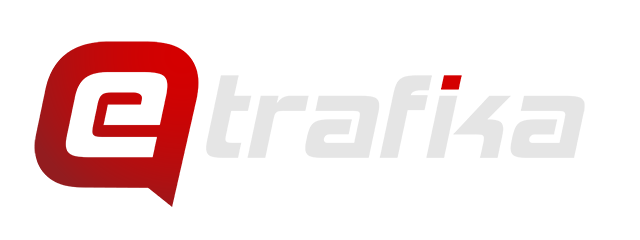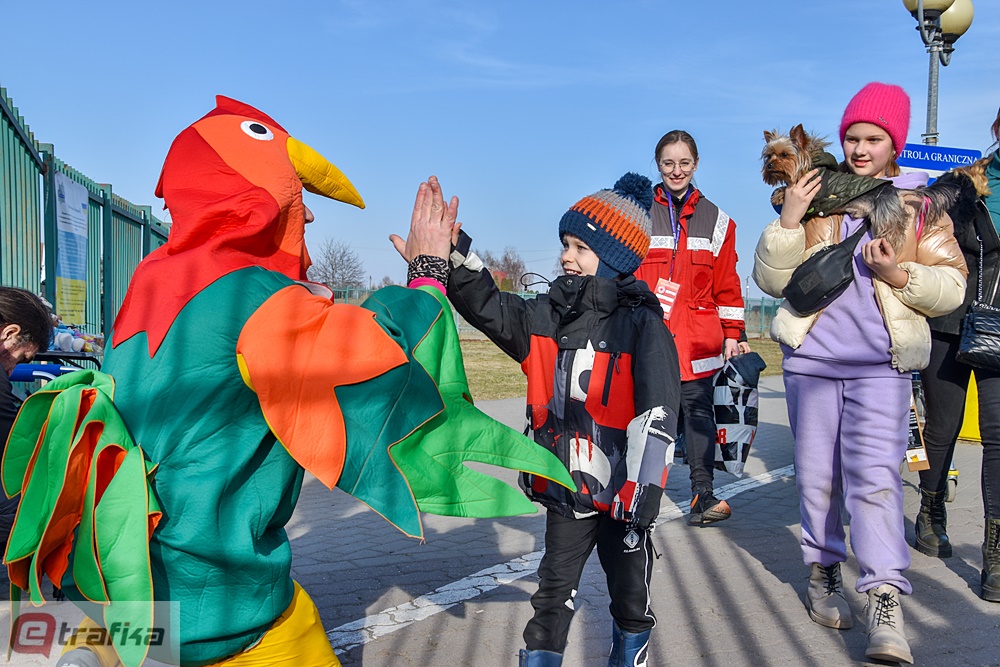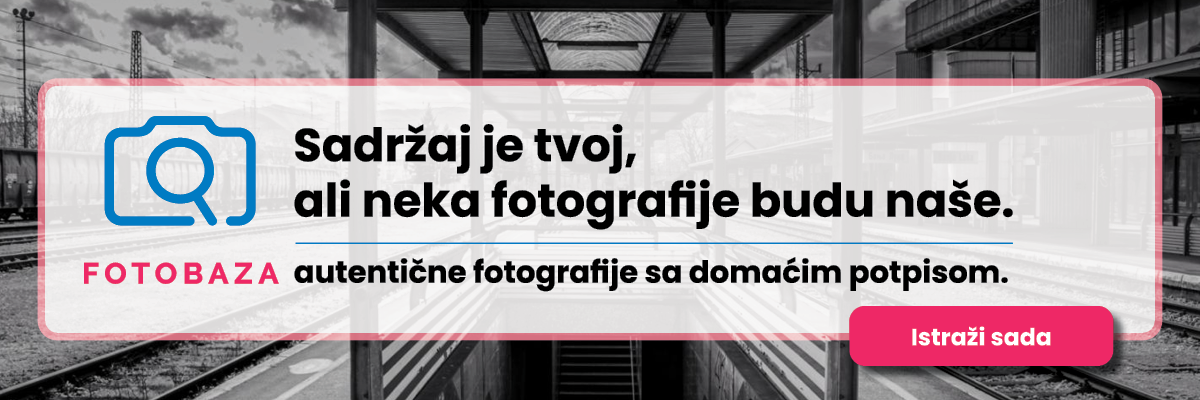Thousands of volunteers are engaged in the reception centres for refugees from Ukraine. They are one of the vital parts of the support system, and some of them have travelled half the world to help refugees. They are giving away food and clothes, providing information, carrying luggage, and also making people happy.
Written by: Vanja Stokić; Photo: Fotobaza.ba – Vanja Stokić
While most of them came through international organizations, some headed to the Ukrainian borders on their own. That is how Ben Dusing, a lawyer from Kentucky, United States, arrived at the Polish-Ukrainian border on Sunday morning.
‘I came alone. I knew some organizations were engaged here and that they needed volunteers. My plan is to get back home on 24 March, I have four kids and I must get back to them. Depending on the situation, if I can be of use here, I’ll come again’, says he in the breaks between hugging people and giving toys to children.
It turned out that a person in a chicken costume was a very effective way of welcoming people. Not only when it comes to children. Adults also want to hug the chicken. When other volunteers saw it, they put the chicken at the very beginning to welcome people.
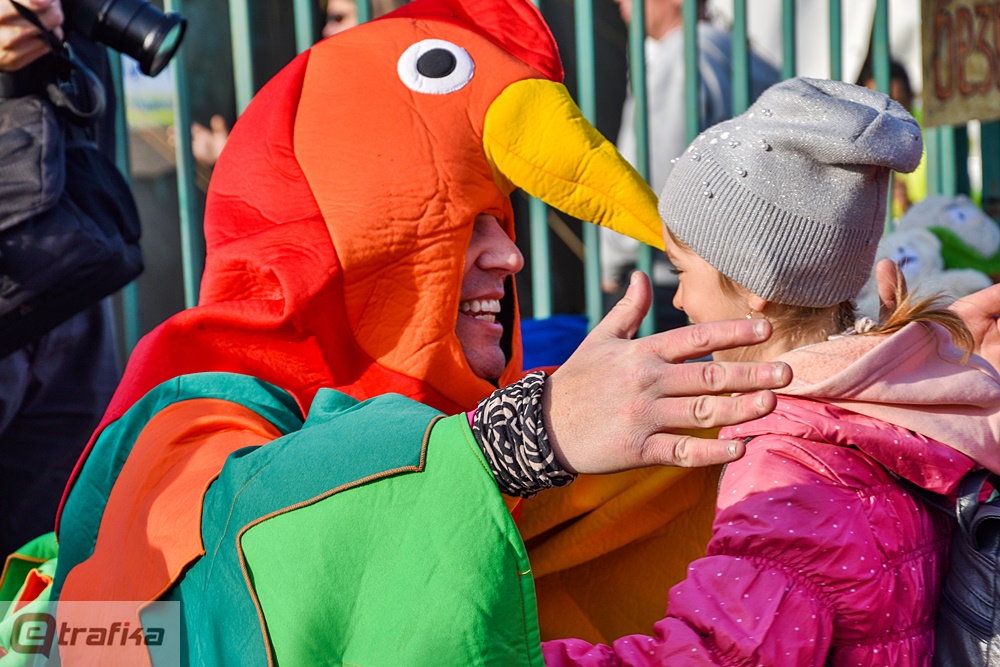
He spent his childhood in Russia and speaks some Russian, which help him communicate with the people that are coming. Dressed in his colourful costume, with a broad smile on his face and toys in his hands he’s helping children and adults to feel as less stressed as possible. To feel accepted. Nevertheless, no costume can hide tears when you ask him how he feels.
‘It’s so emotional, I’m overwhelmed. There are so many bad things happening, but there are good ones as well. Look around you, and you’ll see true humanity. It’s very inspiring’, says he while spreading the wings to an approaching group of people.
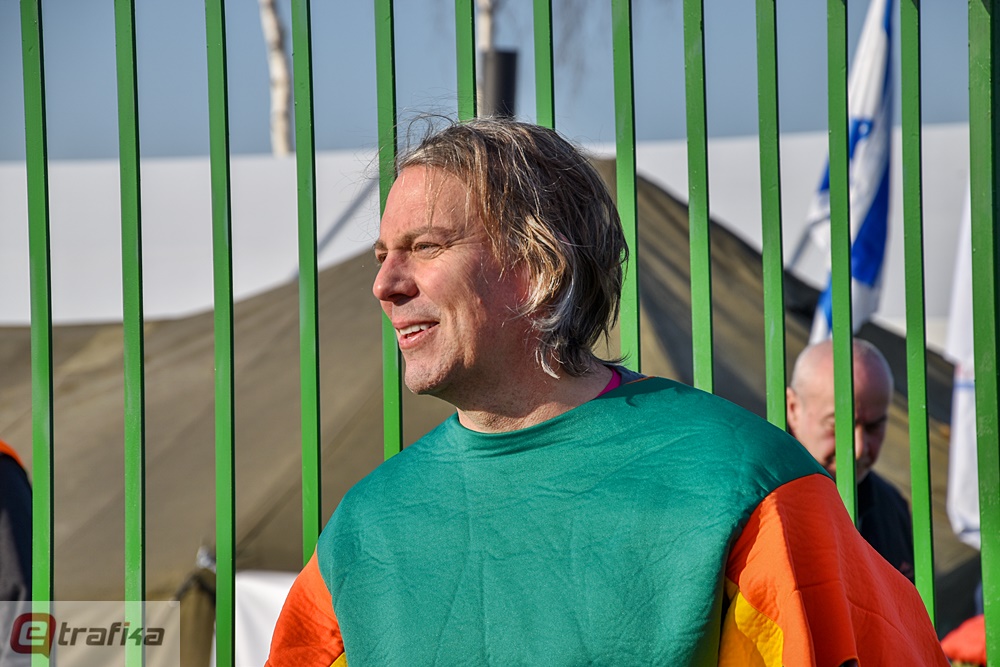
A few hundred metres further, another man is using music to welcome people. Davide Martello is a pianist from Italy, who lives in Germany. He came here in early March and doesn’t plan to leave.
‘I’ve learnt several Ukrainian songs so that I can play the music they are familiar with. I’m here every day, I play for people. They sometimes get closer to me to play music, and sometimes they play music from the internet and I try to reproduce it. I'm happy I can help; but, at the same time, I'm sad because the war doesn't stop. I feel I must stay here as long as people are coming. I want to help them by playing music’, says he in the breaks between two songs, sitting at the piano with a big peace symbol on it.
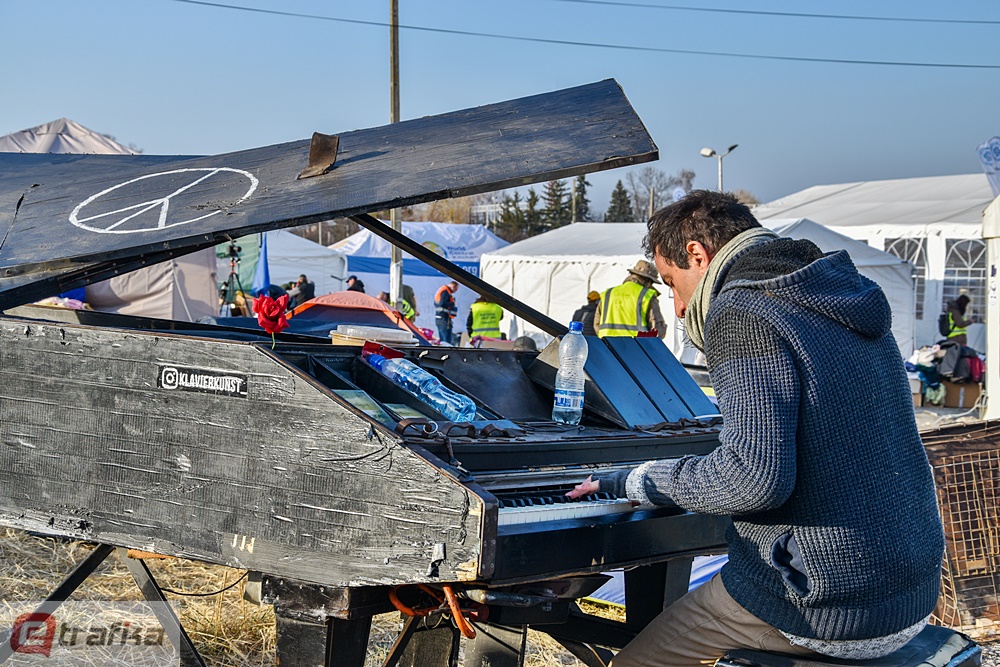
A large number of volunteers have come through Cadena, an international charity. Among them is a Russian, Margarita Klygina, who is at present doing her Master’s studies in Kraków. She started helping refugees from the very beginning of the war in Ukraine. She was first an interpreter in borders and now is an interpreter in a reception centre near the Medyka border crossing in Poland. She says she’s active between 12 and 15 hours a day. It all depends on the number of people coming from Ukraine, which again depends on the situation in the country alone.
‘I’m exhausted. I am constantly feeling so bad because this is horror. But it’s better to help and do what I can than sit at home and watch the news. I’m feeling bad but work helps. I have never felt such solidarity. The reaction of Polish society and international volunteers is astonishing. They are all so kind and full of support. I thought I knew what solidarity was, but I’ve never felt this before. It’s inspiring, it helps us withstand’ says she during the lunch break.
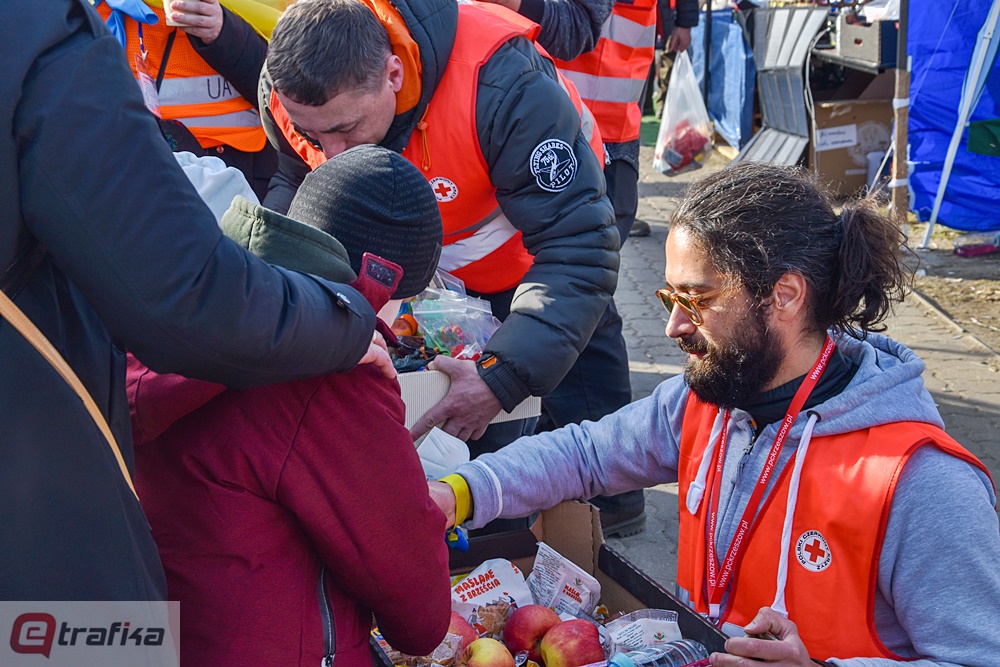
She is volunteering in a shopping centre turned into a reception centre. The shops inside the mall are closed and the passages between them are filled with floor mattresses. Babies, toddlers, women, the elderly…sleep on them. They all are exhausted. To protect their privacy, camera shooting is not allowed inside.
‘Some of them are under huge stress and need counselling. The majority of them is exhausted and just want to sleep. Their basic needs must be satisfied – a place to sleep, food and clothes. Before they cross the border, they travel a long and dangerous journey. Waiting at the border takes hours, nights are very cold, the temperatures drop to -10’ explains Margarita the state of refugees.
She adds that the Ukrainian diaspora in Poland is very large so some of them have relatives who have accommodated them. The others announce they will leave to other European countries.
‘It’s not so bad. They’re very brave and hold on well’, adds she.
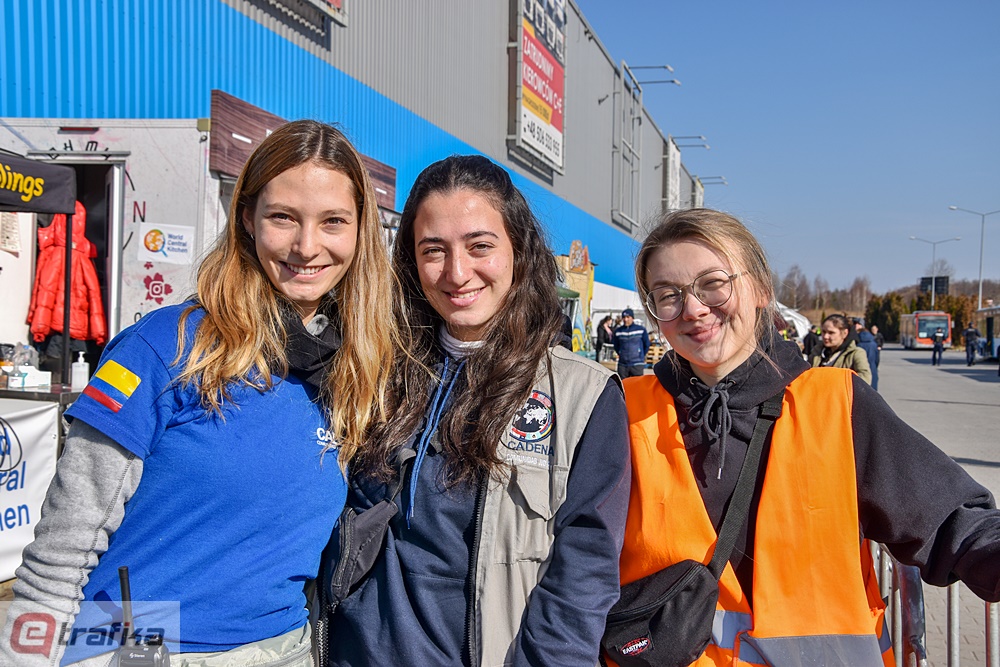
Two girls are volunteering together with her, who crossed half of the world to help refugees. Gabriela Sztrigler is from Mexico and arrived eight days ago. She works with children in an improvised playground in the morning and in the evening, she helps families find accommodation and jobs in Spain.
‘I’m very angry about all this. But I’m very grateful to have the opportunity to help others. I’m sometimes sad and sometimes happy. When we give a child a toy, we can see happiness not only on the kid’s face but also his mother's. It makes me happy. When you give them a small thing, this lifts their mood’, says Gabriela.
She adds that volunteers will remain here as long as necessary.
Her colleague comes from Colombia. Her name’s Natalie Levy and has been here for one day only. She works with children during the day and helps at border crossings in the evening.
‘We had training before we arrived here, we knew we would work with children. We knew it would be complicated as we work with a vulnerable group. However, reading about it is different from experiencing it. I’m a bit shocked, I’m still getting used to it. Some situations make me happy. For instance, I gave a boy a pair of gloves yesterday and he used them as a toy. I’m grateful I can help’, says Natalie. This has been her first international experience.
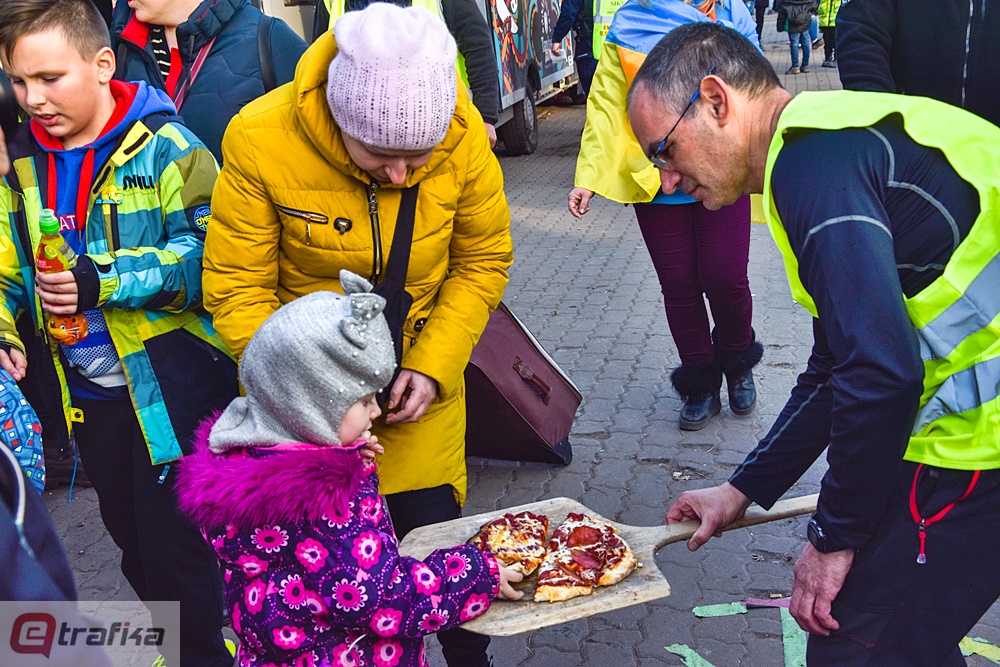
In Slovakia, a neighbouring county, Sam from Pakistan, who is studying in Budapest, is giving food to refugees at the border crossing. He says he can feel the pain of people from Ukraine.
‘I somewhat know to it feels when you have to leave your country. The war should stop so that the people who fled their homes and left their loved ones could return. Governments fight against each other by their own agendas and it's the people who suffer. That’s not right. People had to leave their homes. I hope they will start a new life, and we must support them’, says he briefly.

